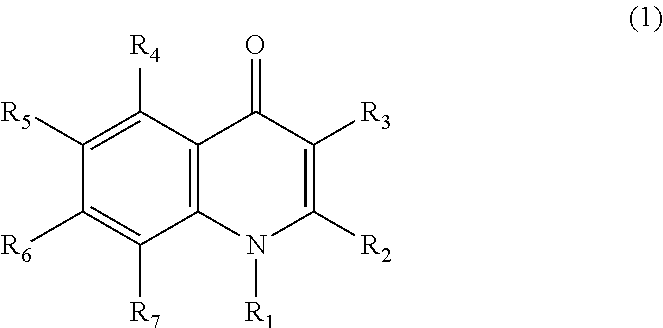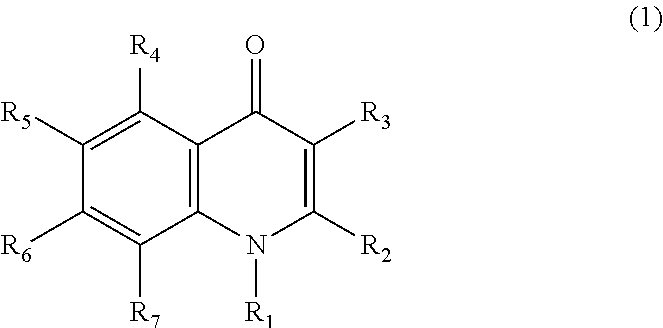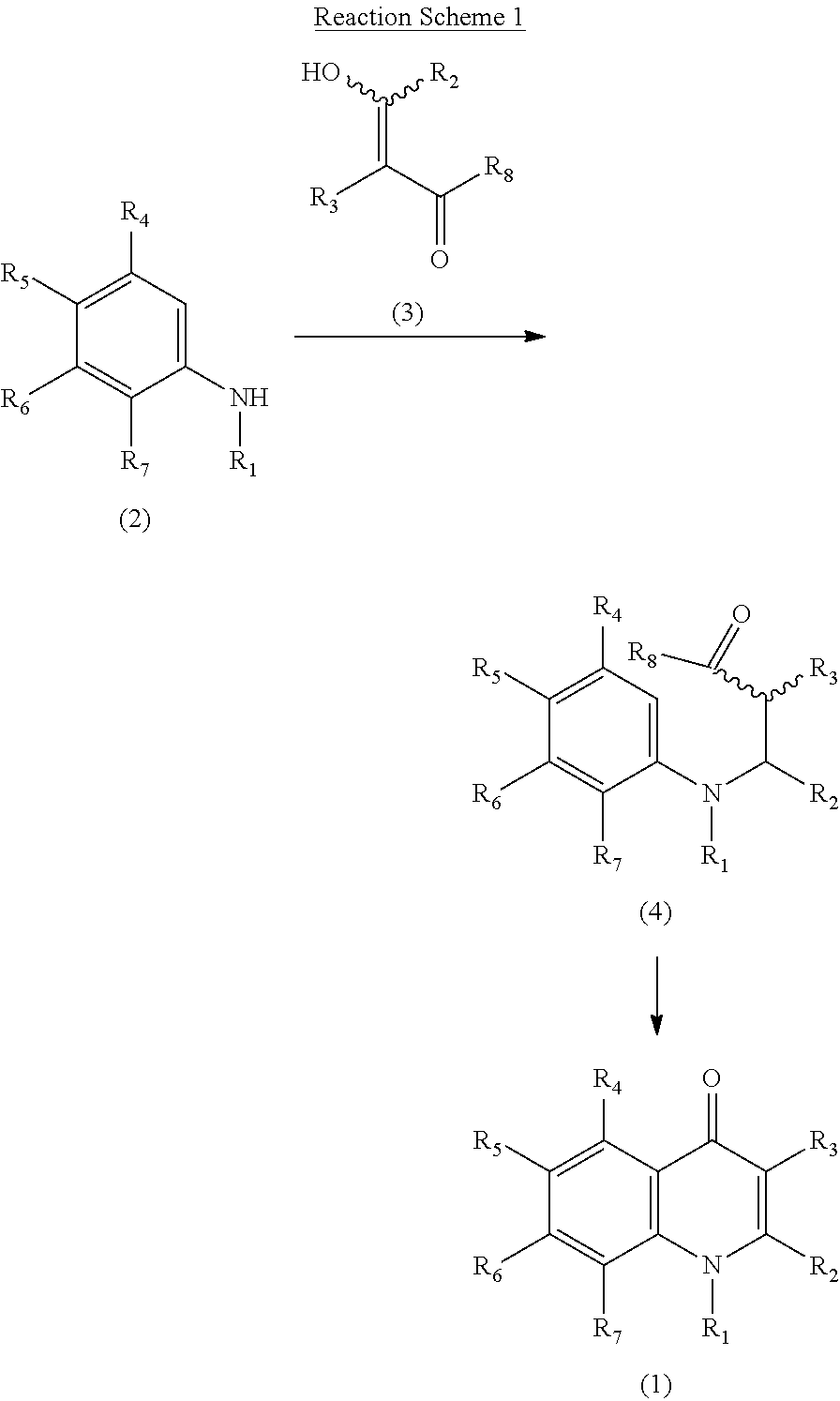Pharmaceutical agent comprising quinolone compound
a technology of quinolone and compound, which is applied in the field of quinolone compound, can solve the problems of loss of the stability and stability of the drug, fluctuations within, and still no fundamental cure for parkinson's disease and other neurodegenerative diseases, and achieves the effects of improving mitochondrial function, effective treatment and/or prevention, and improving the effect of mitochondrial function
- Summary
- Abstract
- Description
- Claims
- Application Information
AI Technical Summary
Benefits of technology
Problems solved by technology
Method used
Image
Examples
reference example 1
4-Methyl-2-nitro-1-propoxybenzene
[0109]A DMF solution (4 ml) of potassium carbonate (5.21 g, 37.7 mmol) and 1-iodopropane (5.80 g, 34.1 mmol) was added to a N,N-dimethylformamide (DMF) solution (10 ml) of 4-methyl-2-nitrophenol (4.0 g, 26.1 mmol), and the mixture was stirred at room temperature for 48 hours. Water was added to the reaction mixture, and the resulting mixture was extracted with ethyl acetate. The organic layer was washed with a saturated saline solution twice and concentrated under reduced pressure. The residue was purified using silica gel column chromatography (n-hexane:ethyl acetate=9:1). The purified product was concentrated under reduced pressure to thereby obtain 4.23 g of pale-yellow oily 4-methyl-2-nitro-1-propoxybenzene (yield: 83%).
[0110]1H-NMR (CDCl3) δ ppm: 1.05 (3H, t, J=7.4 Hz), 1.80-1.86 (2H, m), 2.33 (3H, s), 4.02 (2H, t, J=6.4 Hz), 6.95 (1H, d, J=8.5 Hz), 7.29 (1H, d, J=8.5 Hz), 7.62 (1H, s).
reference example 2
5-Methyl-2-propoxyaniline
[0111]4-Methyl-2-nitro-1-propoxybenzene (2.0 g, 10.2 mmol) and 5% palladium carbon (700 mg) were added to ethanol (30 ml), followed by conduction of catalytic reduction at room temperature under ordinary pressure. The catalyst was removed by Celite filtration, and the filtrate was concentrated under reduced pressure. The residue was dissolved in dichloromethane and dried over anhydrous magnesium sulfate. The resultant dry substance was concentrated under reduced pressure to thereby obtain 1.49 g of reddish-brown oily 5-methyl-2-propoxyaniline (yield: 89%).
[0112]1H-NMR (CDCl3) δ ppm: 1.05 (3H, t, J=7.4 Hz), 1.76-1.86 (2H, m), 2.21 (3H, s), 3.73 (2H, brs), 3.91 (2H, t, J=6.5 Hz), 6.49-6.50 (1H, m), 6.54 (1H, s), 6.66 (1H, d, J=8.0 Hz).
reference example 3
Ethyl α-(hydroxymethylene)-4-methoxyphenyl acetate
[0113]Sodium hydride (60% in oil) (467 mg, 11.7 mmol) was added to a benzene solution (10 ml) of ethyl 4-methoxyphenyl acetate (2.0 g, 10.3 mmol), while being cooled with ice. The mixture was stirred at room temperature for 5 minutes. The stirred mixture was cooled with ice again; ethyl formate (1.02 ml, 12.6 mmol) was added thereto and stirred at room temperature for 3 hours. While being cooled with ice, water and ethyl acetate were added to the reaction mixture, and then 2N hydrochloric acid (6 ml) was added to separate the reaction mixture into two layers. The organic layer was concentrated under reduced pressure, and the residue was purified by silica gel column chromatography (n-hexane:ethyl acetate=4:1). The purified product was concentrated under reduced pressure to thereby obtain 1.97 g of slightly reddish-brown oily ethyl α-(hydroxymethylene)-4-methoxyphenyl acetate (yield: 86%). The resulting object was purged with nitrogen...
PUM
| Property | Measurement | Unit |
|---|---|---|
| time | aaaaa | aaaaa |
| temperature | aaaaa | aaaaa |
| concentration | aaaaa | aaaaa |
Abstract
Description
Claims
Application Information
 Login to View More
Login to View More - R&D
- Intellectual Property
- Life Sciences
- Materials
- Tech Scout
- Unparalleled Data Quality
- Higher Quality Content
- 60% Fewer Hallucinations
Browse by: Latest US Patents, China's latest patents, Technical Efficacy Thesaurus, Application Domain, Technology Topic, Popular Technical Reports.
© 2025 PatSnap. All rights reserved.Legal|Privacy policy|Modern Slavery Act Transparency Statement|Sitemap|About US| Contact US: help@patsnap.com



